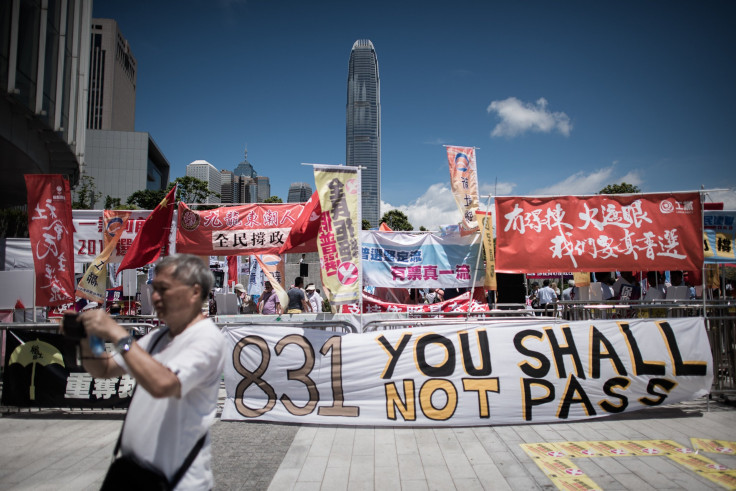Hong Kong Democracy: What Next For Political Reform, After Lawmakers Reject Beijing-Backed Plan

HONG KONG -- After lawmakers rejected a Beijing-backed plan for political reform Thursday, the city's path toward democratic liberalization has become even more uncertain.
The bill rejected Thursday by the city's Legislative Council would have allowed voters to directly elect the city's chief executive for the first time in 2017 -- but with candidates politically screened by a pro-Beijing committee. Pro-democracy lawmakers had derided the Beijing-backed plan as “fake universal suffrage,” during the debate.
The proposal's defeat will result in the continuation of the current system, where the chief executive is effectively appointed by a committee of Beijing loyalists. The political consequences of rejection, however, will be more far-reaching, experts say.
The political polarization resulting from the bitter debate on democratic reform in the city over the last year is expected to first and foremost damage the ability of the current chief executive, Leung Chun-Ying, to govern effectively.
“[Leung] can't work with (pro-democracy legislators) the Pan-Democrats, and he forgot that as a chief executive, he doesn't have any votes [guaranteed],” James Tien, a pro-establishment Hong Kong lawmaker and leader of the city's Liberal Party, told International Business Times.
“He doesn't have a governing coalition, nor a major political party [behind him], so he's ruling issue-by-issue. So I can foresee in the next two years, the Pan Democrats will block whatever the government does,” he added.
For the city's pro-democracy lawmakers, rejection of the bill, though popular with their local power base, will earn them the ill will of the only body that has the power to grant the city the political freedoms they strive for: China's Communist Party.
“We would expect Beijing to avoid communication and dialogue with a majority of democrats, … [and to] adopt a very cool attitude towards them in the coming years,” Sonny Lo, a professor and political analyst at the Hong Kong Institute of Education, told IBTimes.
The bill's rejection will also have negative consequences for Beijing. The Chinese government hoped that limited universal suffrage in Hong Kong would confer greater legitimacy on the chief executive, allowing the region to be governed more effectively, and protect what it sees as vital national security interests in the region.
In addition, the bill's demise risks widening the cultural split between Hongkongers and mainland China, which is already significant. Hong Kong in recent months has seen large protests against cross-border trade, local calls for the number of visitors from the mainland to be capped, and a vicious war of words conducted on social media about the behavior of mainland tourists in the region.
“The real issue is that the Chinese government does not trust local people,” said Surya Deva, an associate professor at the City University of Hong Kong's law school.
“They don't say it -- they merely say that they don't trust certain Pan-Democrats. But the reality is they do not trust the majority of Hong Kong people, and a majority of Hong Kong people do not trust the Chinese government, the Communist Party, and people coming from mainland China. … I foresee a long-term crisis,” he added.
The prospects for a future compromise appear bleak, as the positions of both sides are firmly entrenched, and share little common ground.
The city's pan-democrats, elected to push China to keep its promises to deliver democratic reforms, have an incentive to maintain a hard line on any future deal. When some members of the bloc supported a government-backed political reform deal in 2010, the electorate loudly voiced their disapproval at the ballot box.
The Chinese government, however, sees democracy in Hong Kong as a potential risk to national security. Chinese officials have long feared that Hong Kong could be used as a base for subversion by foreign governments, seeking not only to influence the region's politics, but to undermine mainland China's political system.
China's government has long harbored suspicions about democratic Hong Kong legislators with ties to the U.S., viewing them as potential spies. As a result, it remains utterly unwilling to allow an electoral system to evolve in Hong Kong that it cannot exert a degree of control over.
Beijing officials said before the vote that if the package was rejected, that the only next step they would consider would be offering the same package again in several years.
Whether that will happen remains to be seen. One thing, however, is clear: Hong Kong's pro-democracy forces will be unable to wring concessions out of Beijing, if they cannot get them to a negotiating table. That is a prospect which, for the immediate future, seems highly unlikely.
© Copyright IBTimes 2024. All rights reserved.






















